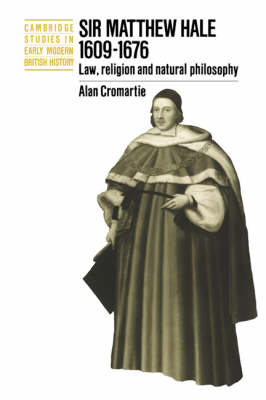
Sir Matthew Hale, 1609–1676
Law, Religion and Natural Philosophy
Seiten
2003
Cambridge University Press (Verlag)
978-0-521-53446-8 (ISBN)
Cambridge University Press (Verlag)
978-0-521-53446-8 (ISBN)
Sir Matthew Hale (1609–76) was the best-known judge of the Commonwealth under Oliver Cromwell, but he nonetheless rose to be Lord Chief Justice under King Charles II. This book surveys all aspects of Hale's work, and supplies fresh perspectives on revolutionary developments in science and religion, as well as politics.
Sir Matthew Hale (1609–76) was the greatest common lawyer of his age, and the most universally admired. Although he held office under Oliver Cromwell, this barely affected his standing in Restoration times. A study of Hale's life and thought necessarily illuminates the central role of the common law in Stuart politics. This book explains Hale's political ideas, and his subtle understanding of the peculiar character of an 'unwritten' law. It also covers his extensive writings on scientific and religious questions, writings which document a shift from puritan to liberal Protestantism. His acute but equivocal response to the science of Descartes and Boyle reveals a fascinating interplay between his 'latitudinarianism' and the new natural philosophy. The result is a unique case study, and a comprehensive portrait of a seventeenth-century mind.
Sir Matthew Hale (1609–76) was the greatest common lawyer of his age, and the most universally admired. Although he held office under Oliver Cromwell, this barely affected his standing in Restoration times. A study of Hale's life and thought necessarily illuminates the central role of the common law in Stuart politics. This book explains Hale's political ideas, and his subtle understanding of the peculiar character of an 'unwritten' law. It also covers his extensive writings on scientific and religious questions, writings which document a shift from puritan to liberal Protestantism. His acute but equivocal response to the science of Descartes and Boyle reveals a fascinating interplay between his 'latitudinarianism' and the new natural philosophy. The result is a unique case study, and a comprehensive portrait of a seventeenth-century mind.
Introduction: a summary life; Part I. Law: 1. Coke: the appeal to reason; 2. Selden: the appeal to contract; 3. The rights of the Crown; 4. Interregnum; 5. Protectorate; 6. Restoration: 'the nature of laws'; 7. Restoration: constitutional theory; 8. Restoration: legal practice; Part II. Religion: 9. Hales's 'puritanism'; 10. Hale's 'latitudinarianism'; 11. Hale and religious dissent; Part III. Natural Philosophy: 12. Natural motions; 13. The Torricellian experiment; 14. The soul; Conclusion; Appendix; Bibliography.
| Erscheint lt. Verlag | 13.2.2003 |
|---|---|
| Reihe/Serie | Cambridge Studies in Early Modern British History |
| Zusatzinfo | Worked examples or Exercises |
| Verlagsort | Cambridge |
| Sprache | englisch |
| Maße | 152 x 229 mm |
| Gewicht | 420 g |
| Themenwelt | Literatur ► Biografien / Erfahrungsberichte |
| Geschichte ► Allgemeine Geschichte ► Neuzeit (bis 1918) | |
| Geisteswissenschaften ► Geschichte ► Regional- / Ländergeschichte | |
| Recht / Steuern ► EU / Internationales Recht | |
| Recht / Steuern ► Privatrecht / Bürgerliches Recht ► Berufs-/Gebührenrecht | |
| ISBN-10 | 0-521-53446-1 / 0521534461 |
| ISBN-13 | 978-0-521-53446-8 / 9780521534468 |
| Zustand | Neuware |
| Haben Sie eine Frage zum Produkt? |
Mehr entdecken
aus dem Bereich
aus dem Bereich
Giordano Bruno - ein ketzerisches Leben
Buch | Hardcover (2024)
C.H.Beck (Verlag)
29,90 €
das dramatische 16. Jahrhundert
Buch | Hardcover (2024)
Rowohlt Berlin (Verlag)
34,00 €


